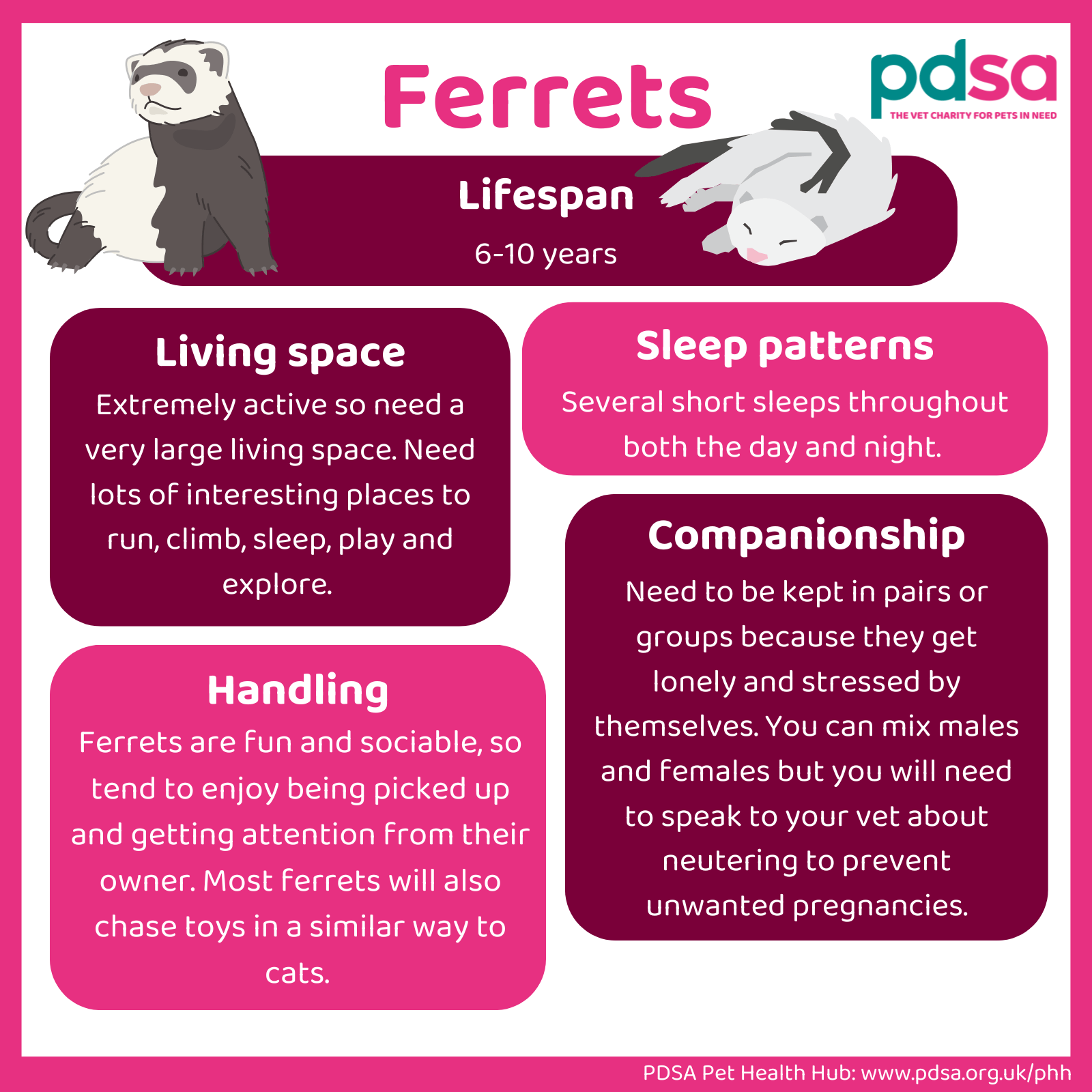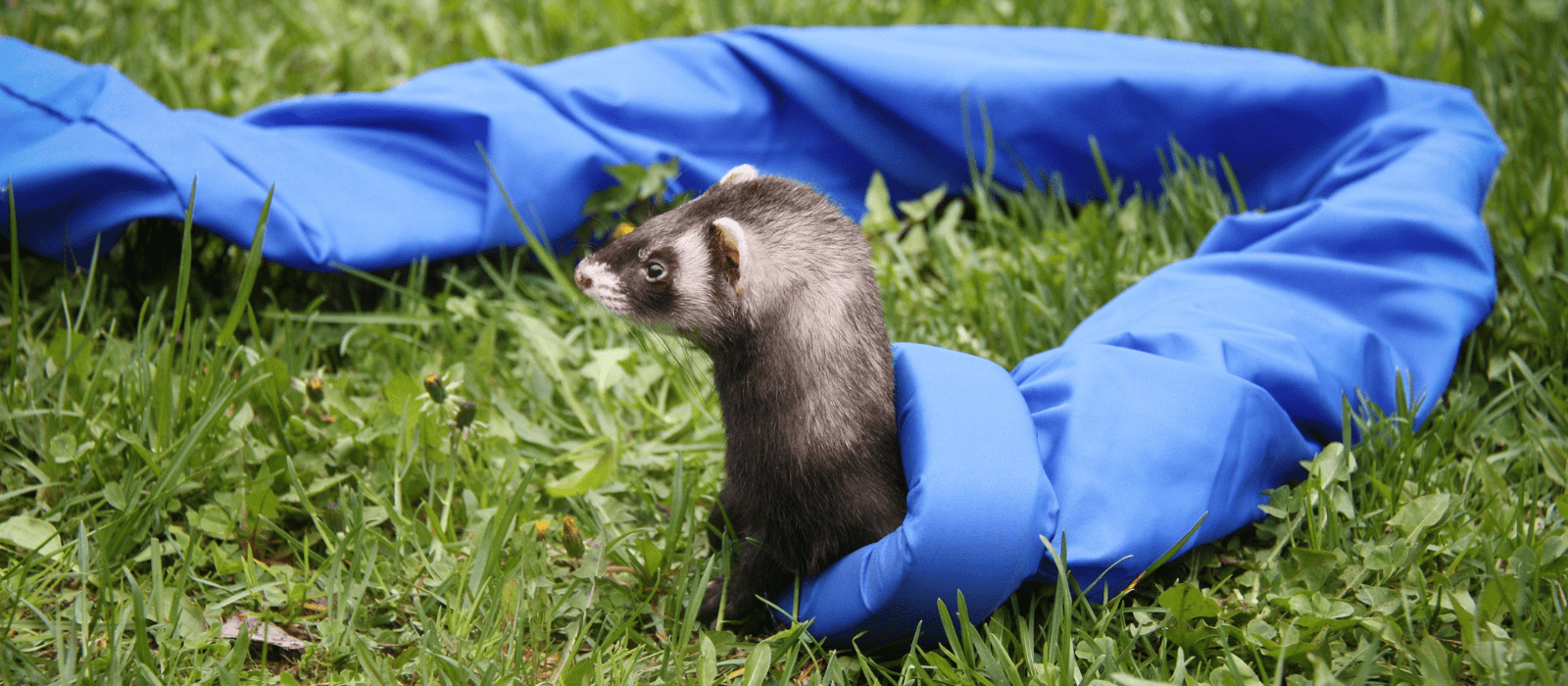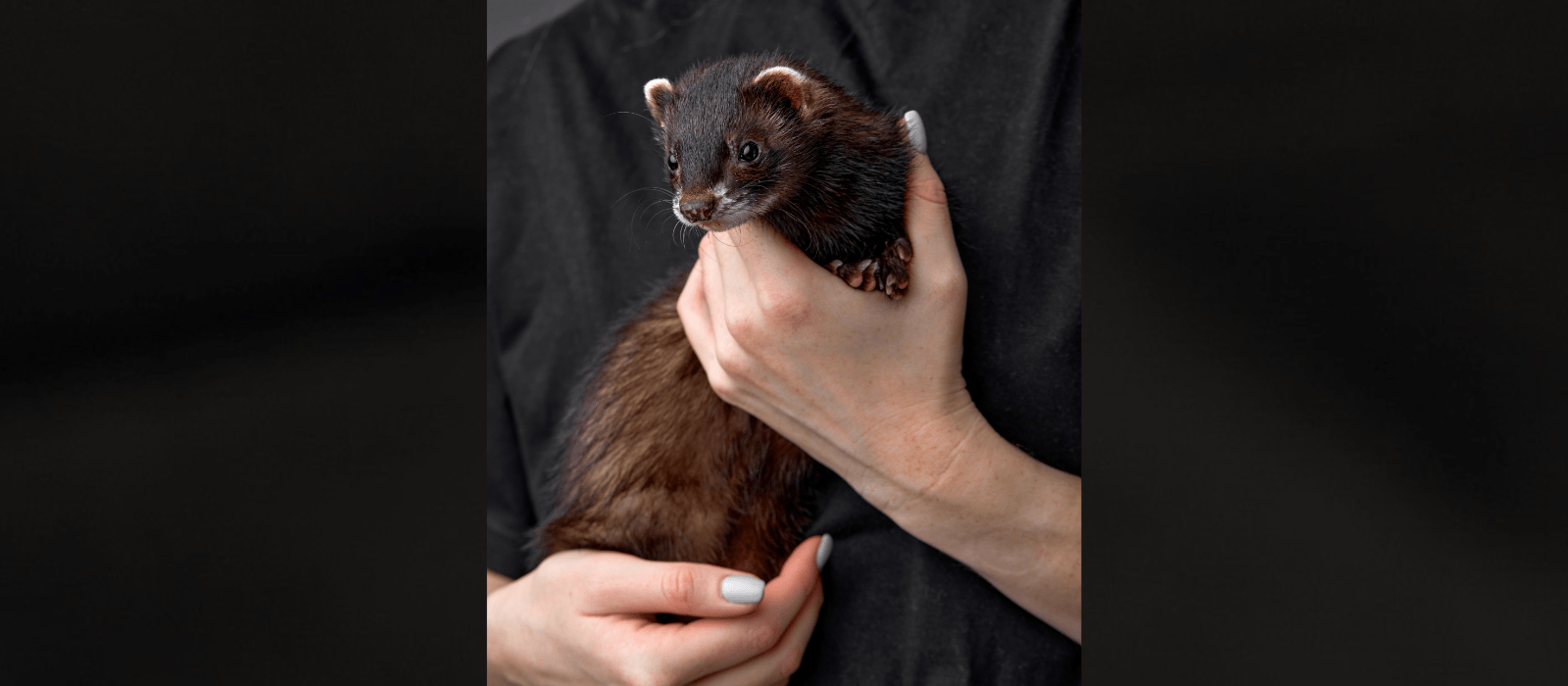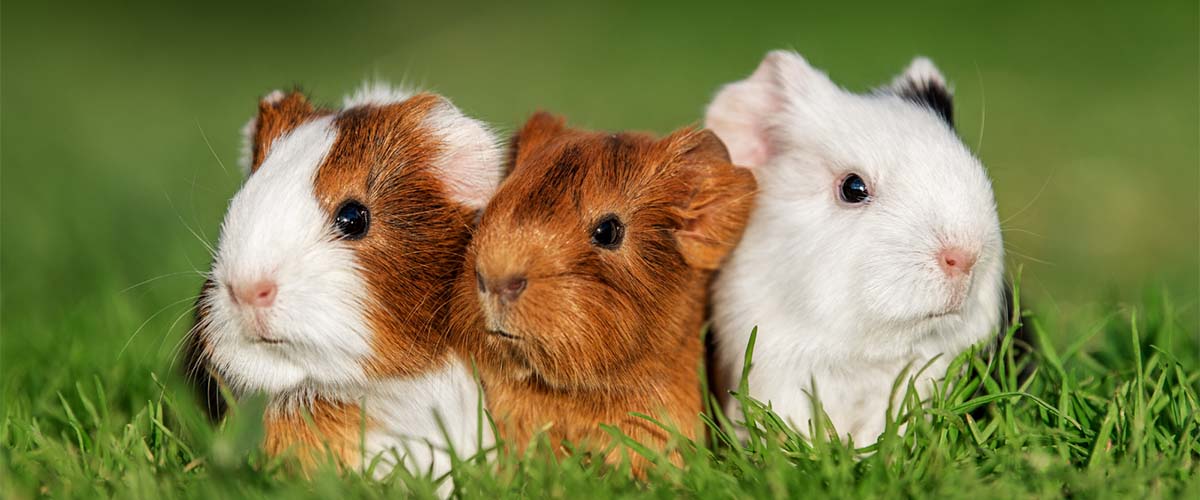Are ferrets good pets?
Ferrets can make great pets if you’re looking for fun, inquisitive, sociable companions.
- They have a typical lifespan of six to ten years.
- They need to live in pairs or groups.
- They need a very large living space (usually custom built) with plenty of things to do.
- They tend to enjoy attention from their owners and being picked up for cuddles.
- They sleep for up to 20 hours a day but will quickly learn your daily routine and play in the morning and evenings.
- They have a distinctive smell that some people find off-putting, although this can be reduced by neutering.
- They are often very friendly if they’ve been handled from a young age but can give a very hard bite if they feel threatened.
If you have lots of time to spend playing and interacting with your pet, a ferret could be perfect for you.

Do ferrets need to live in pairs or groups?
Ferrets are highly social animals that need the company of other ferrets. They can get lonely and stressed if they’re kept by themselves. They also love human company, but it doesn't replace the need for companionship from other ferrets.
We recommend keeping ferrets in pairs or small groups. Most ferrets will freely accept new ferrets into their "gang," regardless of age or sex. However, if you want to keep both males and females together, make sure you speak with your vet about neutering.
What do ferrets eat?
Ferrets are carnivores, which means they need to eat meat to stay healthy. They require a diet that’s high in protein and fat, and low in carbohydrate and fibre. Dog and cat food (wet or dry) is not suitable for ferrets so it’s best to feed them a food made specifically for ferrets.
The ideal diet includes:
- Ferret kibble (dry): Commercially made ferret kibble contains all the nutrients your ferrets need to stay healthy. Ferrets need to eat regularly so it’s best to leave kibble out for them to graze on throughout the day. Just weigh out their daily portion so they don’t become overweight. In comparison to wet food, kibble also helps reduce the build-up of plaque on teeth.
- Occasional treats: Occasional treats are fine, especially for training. Just make sure they are high protein, low carbohydrate and low fibre, for example a piece of boiled egg, cooked chicken, or even a whole raw egg in its shell.
- Fresh drinking water: Ferrets need constant access to clean, fresh water. It should be in a water bottle with a metal spout, and/or heavy bowl (which they can’t tip over).
- We don’t recommend feeding ferrets raw meat: or processed meats such as sausages. Read more below.
Winter weight gain
- It’s normal for ferrets to put on around 40% of their body weight for winter. If you notice your ferret gaining weight at the start of winter, don’t put them on a diet. They should naturally lose the weight when spring comes.
- If your ferret doesn’t lose the weight in spring, take a look at their diet and cut back on treats for a while to help them get back in shape. If you’re concerned about your ferret’s weight, speak to your vet for more advice, and to double check it’s not being caused by another health issue.
The perfect ferret cage
Ferrets are very active, inquisitive creatures, so they need an extremely large living space with different levels, and areas to explore. They also need plenty of toys and play time outside their cage to keep both their mind and body active. Converted sheds, custom-built ferret courts, or a dedicated room are all ideal enclosures. An ideal ferret living space should have:
- A minimum floor space of 10m² per pair of ferrets: If you have more than two ferrets, you’ll need to increase the floor space accordingly. To put this into perspective, 10m² is about the size of two parking spaces, or a small bedroom. Make sure they have enough space to run around, play, sleep, and spend time alone if they want to. Please remember 10m2/pair of ferrets is a minimum recommendation, the bigger the better.
- A solid floor: Ferrets are great escape artists, so they need a solid floor to stop them from digging their way out. We don’t advise wire mesh flooring, but if your enclosure already has it, cover it with something like vinyl flooring to stop your ferrets getting sore feet. Ferrets can develop ‘pododermatitis’ (painful foot pads, often with red sores) if they spend too much time on mesh flooring.
- Weatherproof areas: Ferrets can live inside or outside, but don’t cope well with extreme temperatures. They should be kept between 15-24°C and protected from direct sunlight, wind, and rain. In the winter they will need insulation and extra bedding. In freezing conditions, they may even need additional heat. In the summer, they will need plenty of shade, cool areas to relax, and, in extreme heat, a shallow paddling pool, along with fans or cooling blocks. Ferrets can’t sweat to keep themselves cool, so are at risk of heatstroke in hot weather.
- Platforms and areas to climb: Ferrets enjoy having different levels and areas to climb on, but they don’t have brilliant eyesight so make sure they can’t fall far if they misjudge a jump.
- Beds and bedding: Ferrets need lots of warm, dry places to sleep away from direct sunlight, drafts, and rain. They especially love sleeping in hammocks, so give them plenty, letting them choose to sleep alone or with others. Use some towels and blankets for extra padding and comfort when they sleep. Ferrets don’t usually need any bedding material on the floor of their cage because they tend to use a litter tray for toileting.
- A toilet area: Ferrets tend to toilet in one area. Wait to see where this is, and then put a litter tray there. High sided, corner litter trays tend to be best as ferrets squirt their soft poo upwards. Use a wood pellet litter, never a clumping cat litter (as ferrets may eat it which can be harmful).
- Toys: Ferrets are extremely intelligent, so you’ll need to provide them with lots of toys, and lots of places where they can hide, tunnel, dig, and explore. Ferrets also need several hours per day of play time outside their enclosure and can even be trained to wear a harness and go for walks. Read more about toys for ferrets below.

Ferrets are lively, intelligent animals that love to play and use their brain. To keep your ferrets active and entertained, try these ideas:
- Hide food in tunnels and around their enclosure.
- Fill a toy with their regular food or a special treat.
- Give them the occasional uncooked egg in its shell – your ferrets will love the challenge of opening and eating it, just beware of the mess!
- Use drainpipes, tubes and tunnels for playing, hiding, and running through.
- Provide hand ropes for climbing.
- Offer treat balls, snuffle mats, and puzzle feeders to get their brains working.
- Set up a large storage box full of dry rice or soil to dig in. Ferrets love to dig!
- Ferrets chase toys in a similar way to cats, so try putting a toy on a string and drag it around for them.
How often to clean a ferret cage
Keeping your ferrets clean will minimise their smell and keep them healthy. Do a daily spot clean, and a weekly (or more) full clean.
Daily spot clean
- Clean litter trays.
- Wash and replace any wet/soiled bedding (towels and blankets).
- Clean food and water bowls/bottles.
- Remove any uneaten fresh food (ferrets love hiding food so check for sneaky stashes).
Weekly full clean
- Wash all bedding and hammocks. This is usually the source of the ‘ferrety’ smell they have a bad reputation for! If your ferrets are neutered and their bedding is kept clean, they will only have a very slight smell.
- Strip out their enclosure and scrub it with a pet-safe cleaner. You can buy these from pet shops or our online pet store. Only let your ferrets back into their home once everything is completely dry.
How to hold a ferret
Ferrets tend to be very laid-back and enjoy human company when they’ve been regularly handled from a young age. However, if they're frightened, they can bite pretty hard, which is why it's crucial to get them used to being handled early. Follow the steps below to keep you and your ferret safe and happy:
- Let them run around and play for a while first; ferrets are more likely to accept being held once they've burned off some energy.
- Place one hand under/around their chest.
- Lift and support their hind legs with your other hand.
- Hold them close to your body for security.
Children and ferrets
It's best for young children to begin interacting with your ferrets at ground level:
- Sit them on the floor with a treat in their lap.
- Your ferrets will likely climb into their lap and take the treat. Teach your child to gently stroke them.
Once your ferret is used to being touched by your child, it’s likely they’ll be able to pick them up.

Healthcare
All pet ferrets should be registered with a vet and seen at least every 6-12 months for a general health check. If you notice any signs of illness between checks, contact your vet for an appointment as soon as possible. Your vet will also be able to advise you about vaccines, parasite treatment, and neutering.
Vaccinations
- Distemper: All ferrets kept in the UK should be annually vaccinated against canine distemper. Canine distemper is a serious illness caused by a virus. It tends to start with coughing, sneezing, and a pus-filled discharge from the eyes and nose, and sadly is nearly always fatal in ferrets, even with treatment. Speak to your vet for more information about vaccinations.
- Rabies: Rabies vaccination is only necessary if you’re planning to travel outside of the UK with your ferret. Find out more about travelling with your ferret on the government website.
Parasites
- Fleas, ticks and mites: Just like cats and dogs, ferrets can contract fleas, ticks, and mites, especially if they accompany you on outdoor adventures. Consult your vet for advice on routine parasite control. Their recommendations will be tailored to your ferret's lifestyle. We also recommend keeping a tick remover at home and learning the proper technique for safe tick removal.
- Worms: Ferrets don’t tend to catch intestinal worms, so deworming is rarely needed.
Neutering
- Advantages: Neutering pet ferrets has many advantages:
- Disadvantages: Research has shown that surgical neutering in ferrets (removing the testicles or womb) can increase their chance of developing an adrenal gland problem called ‘hyperadrenocorticism’ later in life. For this reason, we recommend using a hormone implant instead.
- Hormone implants: To avoid adrenal gland problems, we recommend using a hormone implant instead of surgically neutering your ferrets. Hormone implants are small, slow-releasing devices that are placed just under the skin. They stop males from impregnating females for approximately 16 months, and stop females from coming into season for approximately two mating seasons (around 18 to 24 months). Hormone implants also reduce the natural smell of ferrets, but this can take 5 to 14 weeks after implantation. Speak to your vet for more information about hormonal implants in ferrets.
Can I feed my ferret raw meat?
We don’t recommend feeding ferrets raw meat because it comes with a higher risk of problems such as gut blockages, and infections such as salmonella and campylobacter (in both ferrets and humans). These are especially dangerous for high-risk individuals, such as the elderly, young children or those who are immunocompromised. It’s also important to avoid processed meat such as bacon, sausages, and cured meat because they tend to contain a lot of salt. If you want to give your ferrets a meaty treat, feed them plain, unprocessed cooked meat such as chicken, pork, beef or lamb.
Do ferrets smell?
Yes, ferrets tend to have a distinctive, musky smell that some people find off-putting. This is especially true for unneutered males. Neutering your ferrets (either surgically or with an implant) tends to reduce their natural odour.
Do ferrets bite?
Yes, ferrets can bite, but usually, it's not meant to be aggressive. They might bite if they’re scared, upset, or if they're just playing and get a bit too excited. It’s normal for them to nip sometimes, but they don’t usually bite hard unless they’re feeling threatened. Spending time with your ferrets and gentle handling from a young age helps them get used to you and makes them less likely to bite.
Published: Jan 2025

